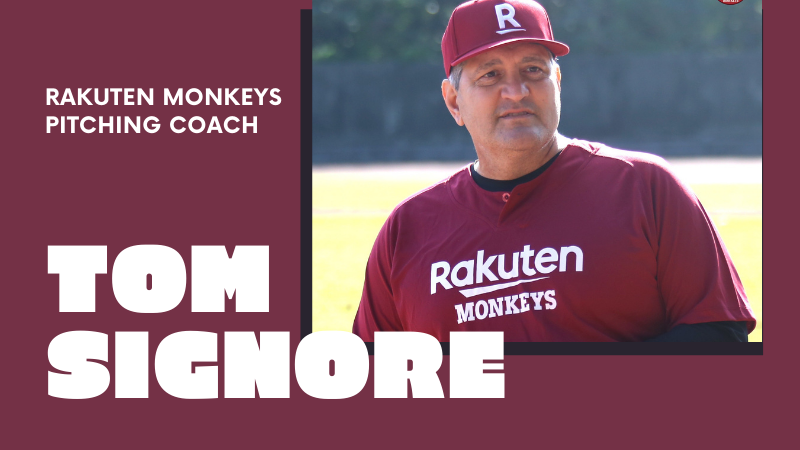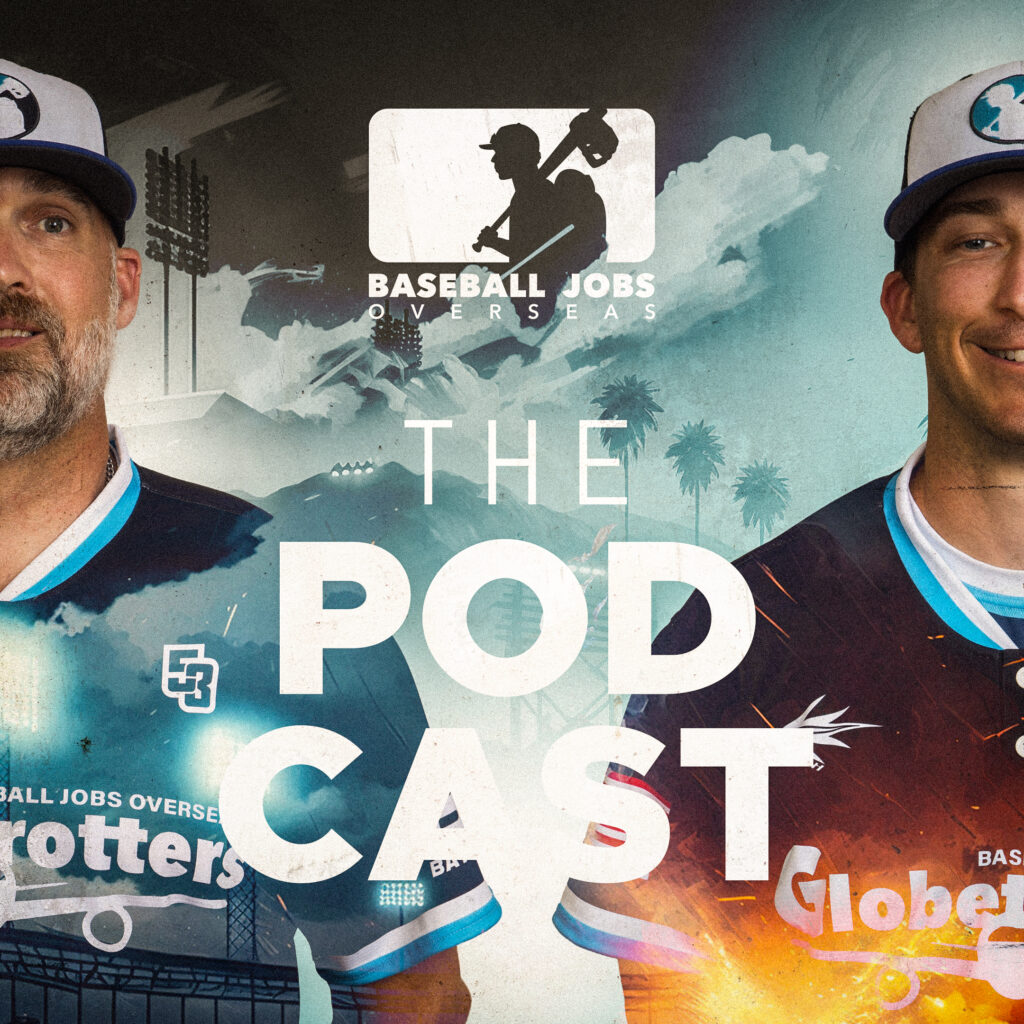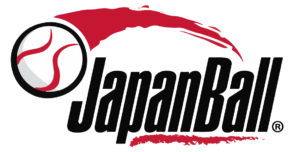September 14, 2020
By Carter Cromwell
Tom Signore represents a case study supporting the old line about a person never knowing what’s around the next corner in life.
Not long ago, he turned a corner that led him from upstate New York to Taiwan.

Signore with the Brooklyn Cyclones
Signore coached at the college level for six years and, starting in 1997, has been a minor-league pitching coach for the Montreal Expos, Florida Marlins, Toronto Blue Jays, New York Mets and Pittsburgh Pirates. He was with the Mets’ AAA Las Vegas affiliate early in the 2014 season when a thrown ball hit him in the head, causing a concussion and eventual loss of sight in his right eye. For the most part, he hadn’t worked since then.
Then, with no warning, he got a call last December from a Taiwanese former player he’d known when he was with the Toronto organization and who now scouts in Taiwan for the San Diego Padres. Would he be interested in coaching in the professional league in Taiwan?
Uh . . . yes. Definitely, yes.
“It came out of the blue,” the 58-year-old Signore said. “I got the call in late December, had a signed contract three days later and was in Taiwan on January 16.”
Now, he’s pitching coach of the major- and minor-league teams for the Rakuten Monkeys of the Chinese Professional Baseball League and learning a new culture and style of play.
It’s similar to how he first got into professional baseball as a coach – another unexpected sharp turn that took him in a new direction.
The Connecticut native graduated from Quinnipiac University, spent the 1985 season as a rookie league pitcher in the Milwaukee Brewers organization, got his master’s degree from Western Connecticut, and coached at Onondaga Community College in Syracuse, NY; Flagler College in Florida; Quinnipiac and Western Connecticut.
Early in 1997, he attended a AAA game in Syracuse, got into a conversation with the Montreal Expos pitching coordinator – whom he had not known previously – and ended up with an offer to be pitching coach for a short-season team in the Expo organization.
Yep . . . that quickly.

Signore with the New Hampshire Fisher Cats
“I’d just finished the season at Western Connecticut and went to this game as a fan,” Signore said. “I was sitting behind home plate where the scouts and the guys that keep pitch counts sit and just happened to start talking with this guy.
“I went home after the game and got a call later that night asking if I could I be with the team in Burlington, Vermont, by June 16. I thought he meant the next season, but he meant the next month!” Signore said with a laugh.
“And I’ve been in pro ball ever since.”
And, like all baseball lifers, he’s been all over the place – Burlington, VT; Cape Fear, NC; Portland, ME; North Carolina again; Auburn, NY; Lansing, MI; Manchester, New Hampshire; Brooklyn, and Las Vegas. And it was in Las Vegas in 2014 where he turned another corner that, for a good while, seemed like a dead-end for his baseball career.
Signore was filling in as pitching coach for Frank Viola, the former major-league pitcher who was undergoing open-heart surgery. During a rain delay, Signore was getting ready to coach a bullpen session with then-prospect Jacob DeGrom. A couple of other players were throwing in what Signore described as an off-limits area in the bullpen, and he was struck by a wayward throw, suffering a concussion and vision loss in his right eye.
He attempted to return later that season with Brooklyn, but the concussion symptoms recurred, and he missed the remainder of the season. He tried to coach again during spring training the following season, but realized on his second day that he couldn’t make a go of it.
“I called my doctor, and she said I needed to get off the field immediately,” he said.
Signore was out of the game the rest of 2015 and all of 2016. He tried to come back during the 2017 spring training with the Pirates, but couldn’t do it because of dizziness and balance issues. He stayed out of the game in 2018 and then couldn’t find work in 2019. Though he’d overcome the concussion symptoms, adjusted to seeing with only one eye and was ready to work, he couldn’t help but wonder if his career was finished.
“It took me three years to get back to being able to do the things a coach has to do,” he said, “and, by that time, I wasn’t finding anything.”
Instead, he was at home near Syracuse, NY, with his wife – a supervisor at a medical technology laboratory – and daughter, a recent graduate of Syracuse University. Then came the call.
“It was completely unexpected,” Signore acknowledged. “I’d had interviews before that, but nothing solid. Older guys are getting phased out, even if you’re like me and up to speed on all the analytics.”
Not long after he got to Taiwan, the Covid-19 pandemic hit. The season had been scheduled to start March 14 but didn’t get under way until April 11. At first, there were no fans in the games, though certain numbers were gradually allowed in, and capacity crowds are now allowed.
“For the first 20 or 30 games, we had cardboard cutouts and mannequins in the seats,” Signore said. “They even had robots playing musical instruments.”
Taiwan has very effectively battled the pandemic. A country of approximately 24 million people, it had only 499 confirmed cases and seven deaths, as of September 12th.
“They’ve done a great job here,” Signore said. “They were hit very hard by SARS in 2003 and said ‘never again’. Everyone has to wear masks in public, and we have to have our temperatures taken and our hands washed and sanitized whenever we go into a ballpark – even when we go into the underground parking lot at our home stadium.”
The team is playing solidly. The four-team CBPL plays two 60-game halves, and the Monkeys finished second in the first half and are tied for second place as of September 14th. The winners of the two halves will meet in a best-of-nine championship series, unless the same team wins both halves – in which case the club with the second-best record will get a spot.
Signore has found the entire experience – on and off the field – very interesting and, at times, unusual.
As expected, the style of play is different in some respects from the American game.
“They want feedback on the overall program,” Signore said, “which is good, but it’s a different thought process here, and no American guy is going to change that overnight.
“For one thing, I think the throwing program for pitchers is too long. I once observed a 100-pitch bullpen session – for a reliever! I’ve been tracking the pitchers’ velocities, and I’ve seen a noticeable drop-off. I want a shorter, more structured program so they can save their bullets for the games.”
The length of games is another issue, as it is in the U.S.

Signore with the Rakuten Monkeys
“Our goal is to finish games in less than three hours,” he said, “but we only did that 11 times, and we’ve had approximately 25 that went longer than four hours. A quicker pace puts pressure on the other team and also helps our defenders – there’s less chance of them losing concentration. To me, there shouldn’t be more than 7-9 seconds between pitches if no one is on base, but it’s tough to push the pace here because they don’t want to upset the opponents. It’s a real cultural difference.”
He’s found that Taiwanese hitters are very disciplined and that the game, in general, is tilted toward offense.
“Here, even with 0-2 counts, the hitters don’t feel as if the pitchers are in the driver’s seat,” he said. “They will not swing at a slider in the dirt, and it’s amazing the number of good pitches they spoil.
“The scores are high here,” he added. “Scorers tend to score things as hits, rather than errors. They don’t bunt much, either, except maybe from the seventh inning on.”
Another thing Signore noticed is that pitchers tend to toss out balls that are scuffed.
“I tell them not to because you can get extra movement with a scuffed ball,” he said with a chuckle.
Signore works through an interpreter, which sometimes creates some amusing situations.
“He can’t translate every word verbatim because there’s sometimes no Mandarin word to describe exactly what I’m saying in English,” he said. “Once, I’d been having trouble getting one of our pitchers to consistently get his hand on top of the ball, so I finally told him to just throw the ball on top of the plate. And it worked. Later, I asked the translator what he said, and he said he told the pitcher to throw the ball at the catcher’s shoes.”

Signore giving a Taiwanese ump a piece of his mind
Despite regular 12-hour days at the ballpark, he’s also managed to get some time to himself for a few non-baseball experiences.
“Other than the ballpark, the place I’ve spent the most time is the 7-11 store,” he said with a laugh.
“During Chinese New Year, though, I had dinner at the home of the team’s operations guy, and I had 12 dishes I’d never had before,” he said. “Another time, I had goose for the first time, and it was good. I’ve been to some night markets, too. There’s one right across from our stadium. Some temples, too, particularly during Chinese New Year. The ornate designs are amazing, and the detail is incredible.
“Overall, this has been a great experience.”
Travel the world using baseball or softball as your ticket
Our baseball and softball members get paid to play or coach overseas year-round, mostly in Europe and Australia.
There are a variety of levels overseas which present opportunities for both the college grad and the established professional.




 Moonshot is a baseball apparel company based out of Mannheim, Germany, and is owned and operated by a good friend of ours, Juan Martin. What separates Moonshot from the other companies we have used in the past, is the value for your money and the customer service. You will not find prices like this in Europe or someone that responds faster.
Moonshot is a baseball apparel company based out of Mannheim, Germany, and is owned and operated by a good friend of ours, Juan Martin. What separates Moonshot from the other companies we have used in the past, is the value for your money and the customer service. You will not find prices like this in Europe or someone that responds faster. 
 High end, professional wood and composite bats with a wide selection of models using many different types of wood from Japan, North American and Taiwan. Hakusoh Bat is approved with the WBSC and across Europe.
High end, professional wood and composite bats with a wide selection of models using many different types of wood from Japan, North American and Taiwan. Hakusoh Bat is approved with the WBSC and across Europe. 




